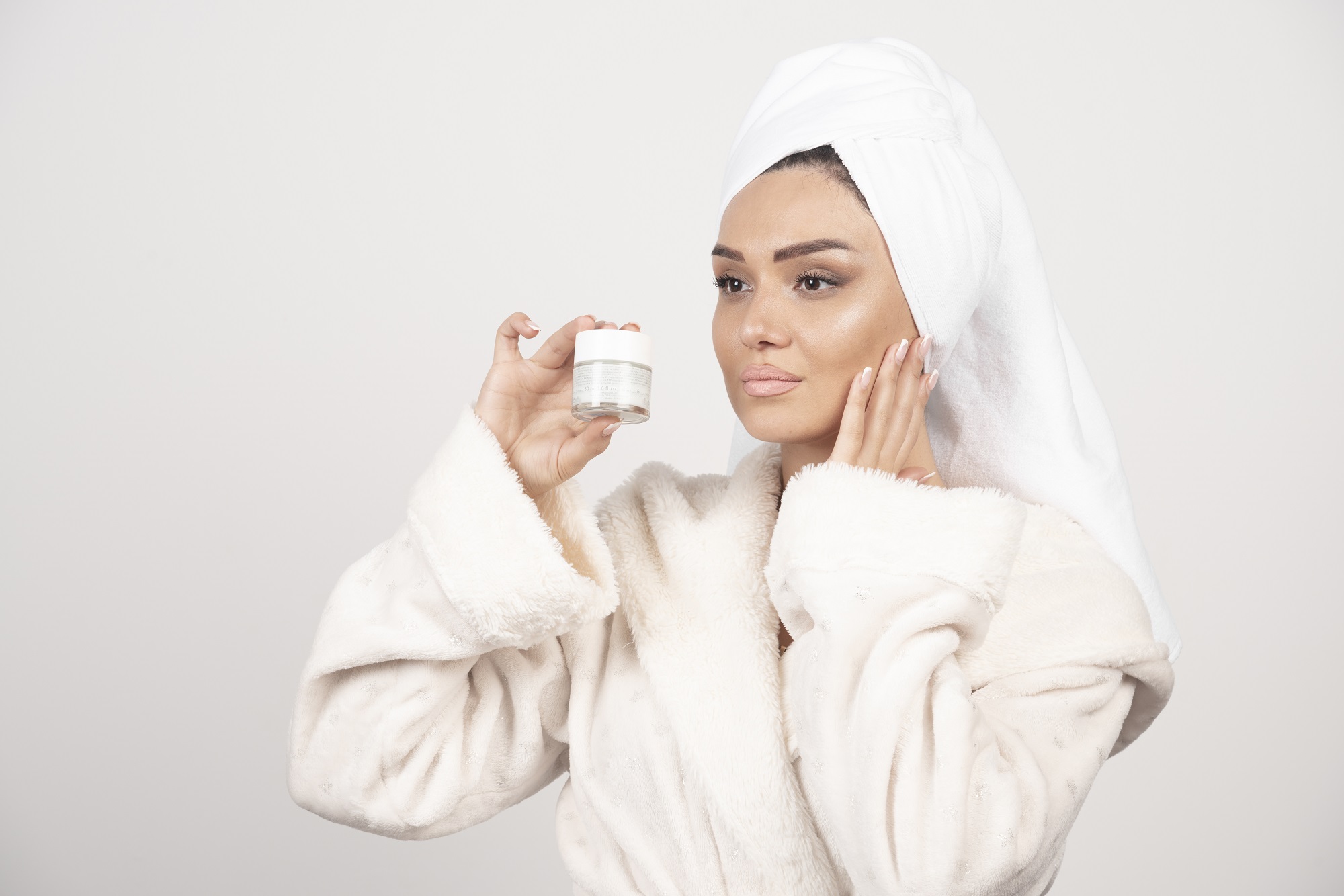How Does Glutathione Work in Promoting Skin Whitening?
Glutathione promotes skin whitening by inhibiting the production of melanin, the pigment responsible for skin color. Specialized cells called melanocytes produce melanin, and its overproduction can cause uneven skin tone, age spots, and other pigmentation issues.
Glutathione works by interfering with the activity of the enzyme tyrosinase, which is essential for the production of melanin. By reducing tyrosinase activity, skin whitening glutathione helps to limit the amount of melanin produced, leading to a gradual lightening of the skin over time. Additionally, glutathione’s powerful antioxidant properties help to protect the skin from environmental stressors and damage, further enhancing the skin’s overall radiance and luminosity.
The Benefits of Using Glutathione for Skin Whitening

- Skin Lightening: Glutathione’s ability to inhibit melanin production results in a gradual, even skin lightening that can help to reduce the appearance of age spots, freckles, and other pigmentation issues.
- Improved Skin Tone: By regulating melanin levels, glutathione can help to create a more uniform and even skin tone, giving the complexion a more radiant and youthful appearance.
- Enhanced Skin Brightness: Glutathione’s antioxidant properties help to combat free radicals and oxidative stress, which can dull the skin’s natural glow. By reducing these factors, red carpet facial glutathione can help to enhance the skin’s natural brightness and luminosity.
- Anti-Aging Benefits: Glutathione’s ability to protect the skin from environmental stressors and oxidative damage can also help to reduce the visible signs of aging, such as fine lines, wrinkles, and age spots.
- Improved Skin Health: Glutathione plays a crucial role in maintaining cellular health and supporting the skin’s natural detoxification processes, which can lead to an overall improvement in skin quality and resilience.
Different Forms of Glutathione Supplements for Skin Whitening
When it comes to incorporating glutathione into your skin whitening regimen, there are several different forms of supplements to consider:
- Oral Glutathione Supplements: These are capsules or tablets that contain concentrated doses of glutathione, designed to be taken orally. Oral supplements can help to increase the body’s natural glutathione levels, promoting a more systemic approach to skin whitening.
- Intravenous (IV) Glutathione Treatments: For a more potent and immediate effect, some individuals opt for IV glutathione treatments, where the compound is administered directly into the bloodstream. This method can result in faster and more noticeable results, but it typically requires the supervision of a professional skin specialist.
- Topical Glutathione Serums or Creams: These products are applied directly to the skin, allowing the glutathione to be absorbed and work its magic from the outside in. Topical glutathione formulations can be particularly effective in targeting specific areas of concern, such as dark spots or uneven skin tone.
- Liposomal Glutathione: This innovative form of glutathione utilizes liposomes, which are tiny lipid-based carriers, to enhance the bioavailability and absorption of the compound. Liposomal glutathione is often touted as a more effective and efficient way to deliver the benefits of glutathione to the skin.
Factors to Consider When Choosing Glutathione Products for Skin Whitening

- Ingredient Quality: Look for products that use high-quality, pure glutathione sourced from reputable suppliers. Avoid products that contain fillers, artificial additives, or other questionable ingredients.
- Glutathione Concentration: The concentration of glutathione in a product can vary significantly, so it’s important to choose a formulation that contains a sufficient amount to be effective. As a general rule, aim for products with at least 500 mg of glutathione per serving.
- Bioavailability: Consider the form of glutathione and whether it is designed to enhance absorption and utilization by the body. Liposomal or encapsulated glutathione formulations may be more bioavailable than standard oral supplements.
- Third-Party Testing: Look for products that have undergone third-party testing to ensure purity, potency, and safety. This can provide an added layer of assurance in the quality of the product.
- Brand Reputation: Research the brand and manufacturer to ensure they have a proven track record of producing high-quality, effective skin whitening products. Read reviews and seek out recommendations from trusted sources.
- Compatibility with Skin Type: Evaluate the formulation of topical glutathione products to ensure they are suitable for your specific skin type and concerns. Consult with a dermatologist or skincare professional if you have any doubts.
Tips for Incorporating Glutathione into your Skincare Routine
- Start Slow: When introducing glutathione-based products into your routine, it’s best to start with a lower concentration or frequency of use to allow your skin to adjust. Gradually increase the dosage or application as your skin becomes more accustomed to the compound.
- Combine with Complementary Ingredients: For maximum effectiveness, consider pairing glutathione with other skin-brightening ingredients, such as vitamin C, kojic acid, or licorice root extract. These synergistic combinations can enhance the overall skin whitening benefits.
- Consistency is Key: Consistent use of glutathione products is crucial for achieving noticeable and long-lasting results. Incorporate glutathione into your daily skincare routine, whether it’s through oral supplements, topical serums, or a combination of both.
- Maintain a Healthy Lifestyle: Glutathione’s effectiveness can be further amplified by adopting a healthy lifestyle. Ensure you are getting enough sleep, staying hydrated, and maintaining a balanced diet rich in antioxidants and other skin-nourishing nutrients.
- Protect Your Skin: Complement your glutathione regimen with sun protection measures, such as using a broad-spectrum sunscreen and limiting sun exposure, to prevent further pigmentation and discoloration.
- Monitor Your Progress: Regularly assess the changes in your skin’s appearance and texture to track the effectiveness of your glutathione-based skincare routine. This can help you make any necessary adjustments to optimize your results.
Potential Side Effects and Precautions When Using Glutathione for Skin Whitening
Users generally consider glutathione safe when used as directed, but they should stay aware of potential side effects and take necessary precautions:

- Allergic Reactions: Some individuals may experience mild skin irritation, redness, or allergic reactions when using glutathione products. Experts recommend performing a patch test before incorporating a new glutathione-based product into your routine.
- Gastrointestinal Discomfort: Oral glutathione supplements may cause mild gastrointestinal issues, such as nausea, bloating, or diarrhea, in some people. If these symptoms persist, it’s best to discontinue use and consult a healthcare professional.
- Interaction with Medications: Glutathione may interact with certain medications, including chemotherapy drugs, anticoagulants, and anti-seizure medications. If you are currently taking any medications, it’s crucial to consult with your healthcare provider before using glutathione supplements.
- Pregnancy and Breastfeeding: Researchers have not yet fully established the safety of glutathione use during pregnancy and breastfeeding. Experts recommend avoiding glutathione supplements or seeking guidance from a healthcare professional if you are pregnant or nursing.
- Underlying Medical Conditions: Individuals with certain medical conditions, such as liver or kidney disease, may need to exercise caution or avoid glutathione supplements altogether. It’s essential to consult with a healthcare provider before using glutathione if you have any pre-existing health concerns.
- Quality and Source: Ensure that you are purchasing glutathione products from reputable and reliable sources to minimize the risk of contamination or adulteration, which could potentially lead to adverse effects.
Conclusion
Glutathione has emerged as a game-changing ingredient in the realm of skin whitening, offering a safe and effective solution for those seeking a more radiant, even-toned complexion. By inhibiting the production of melanin and providing powerful antioxidant protection, glutathione can help to reduce the appearance of age spots, freckles, and other pigmentation issues, while also enhancing the skin’s natural brightness and luminosity.
Whether you choose to incorporate glutathione through oral supplements, topical serums, or a combination of both, it’s essential to approach its use with a well-informed and consistent method. By considering the factors that contribute to the effectiveness and safety of glutathione-based products, and by complementing your regimen with other natural methods, you can unlock the full potential of this remarkable compound and achieve the skin whitening results you desire.
